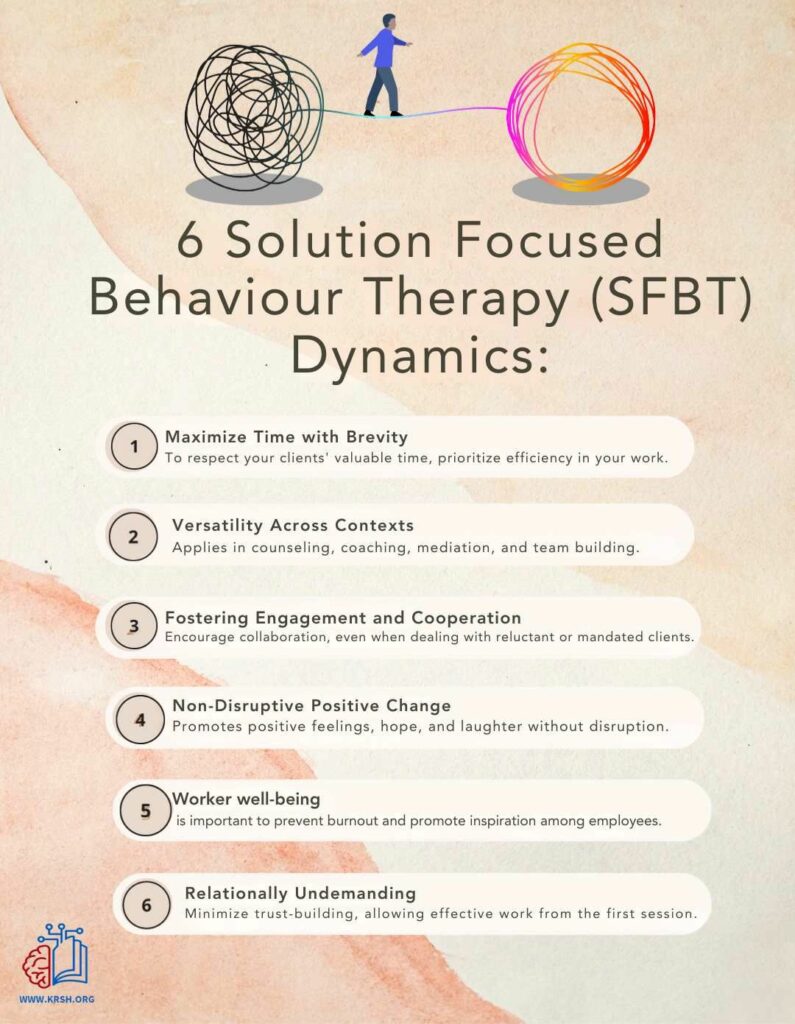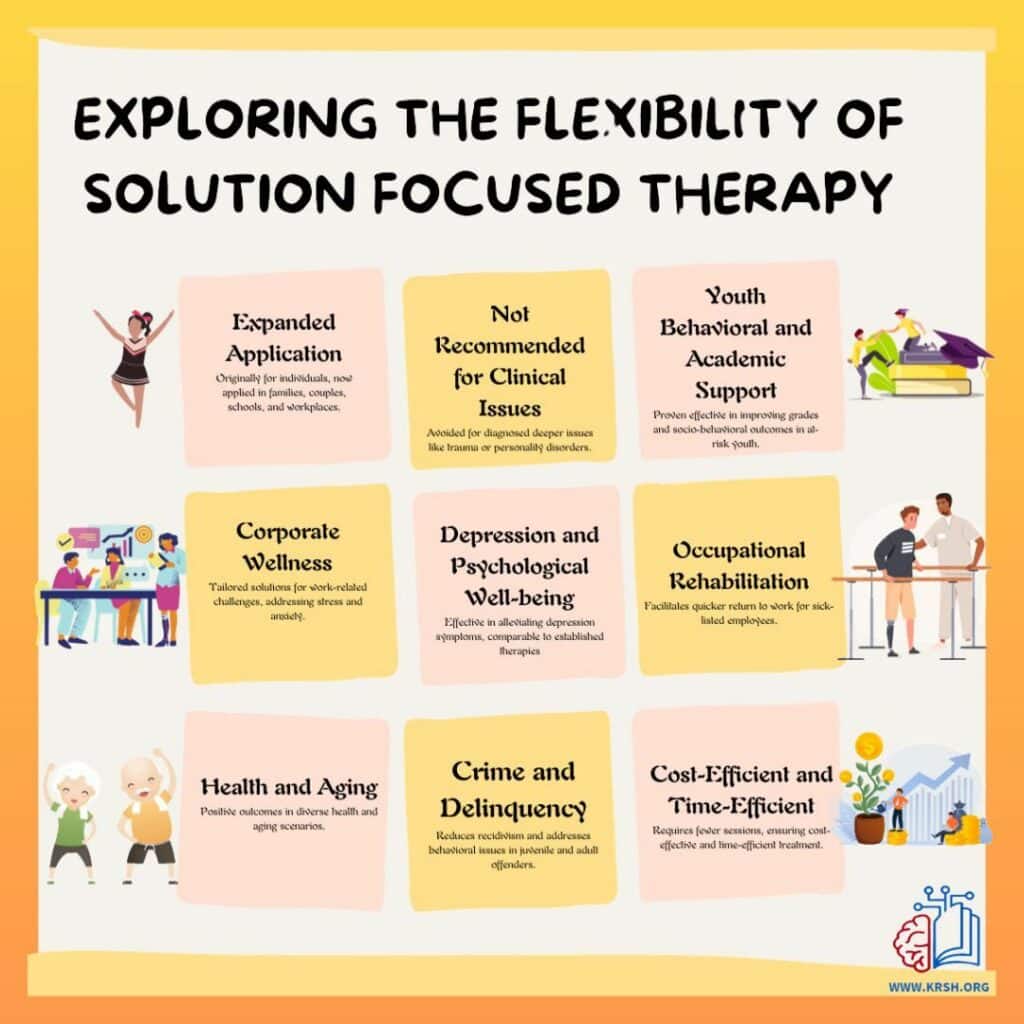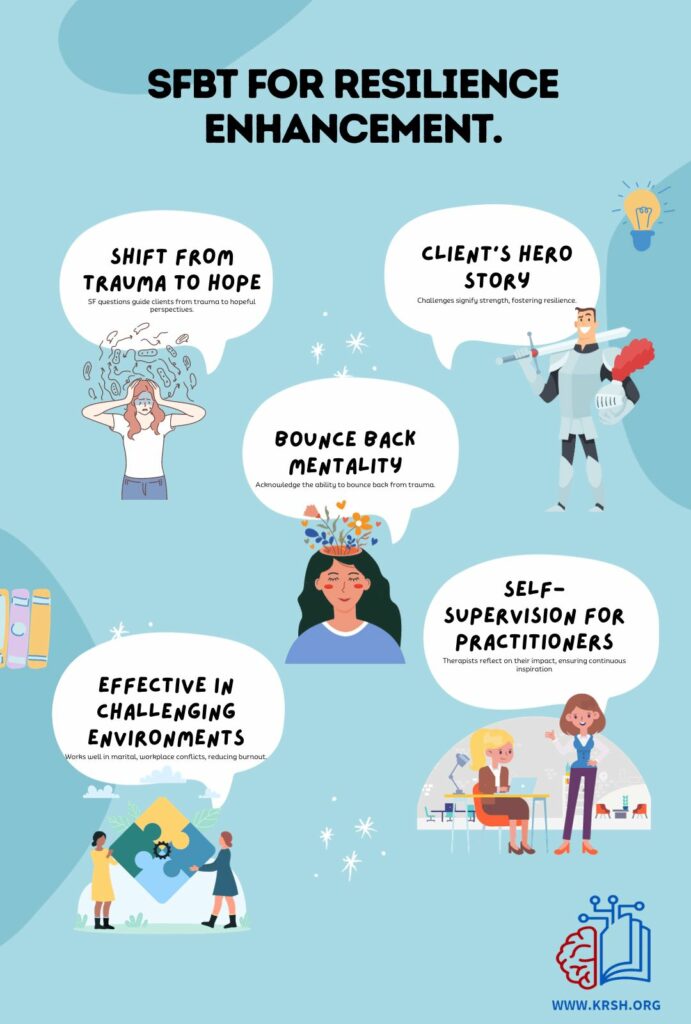Solution-Focused Brief Therapy (SFBT) provides utility for corporate professionals due to its emphasis on brevity and respecting clients’ time commitments. This approach ensures efficiency by allowing busy individuals to make meaningful progress without prolonged therapy. For employers, it translates to cost efficiency and higher ROI.
SFBT is effective in tackling a diverse range of concerns such as anxiety, stress, behavioral, personal relations and academic challenges. The approach also shows promise in alleviating symptoms of depression, aiding occupational rehabilitation, and contributing positively to graceful aging.
Beyond addressing problems, SFBT actively contributes to building resilience. By shifting focus from trauma to hope, it guides individuals towards a future-oriented perspective.
SFBT Dynamics

SFBT uses the following assumptions:
- Change is constant and inevitable.
- Small changes result in bigger changes.
- Since you can’t change the past, concentrate on the future.
- People have the resources necessary to help themselves: they are the experts.
- Every human being, relationship and situation is unique.
- Everything is interconnected.
- Every problem has at least one exception.
- Therapy is not the only way people change, there are many things that are therapeutic.
- Change doesn’t always have to be a long and arduous process – sometimes, it can be quick and surprisingly effective.
1. Brevity: Maximizing Client’s Time
Solution Focused practice prioritizes brevity, ensuring efficiency and respecting clients’ time commitments. Beginning work from the first session and treating each encounter as potentially the last, practitioners uphold the principle that therapy should take “as long as it takes and not one session more.” This approach is particularly advantageous for busy clients in India, allowing them to make meaningful progress without an undue time burden.
2. Flexibility Across Settings
The versatility of Solution Focused practice extends across diverse contexts, including counseling, coaching, mediation, and team building. This flexibility allows for its use in informal conversations, formal therapeutic settings, face-to-face, over the phone, and even through online platforms. With no exclusion criteria, the approach facilitates a seamless and adaptable application, making it a valuable tool across various scenarios and client demographics.
3. Building Engagement and Cooperation
Solution Focused practice excels in cultivating engagement, even with mandated clients initially hesitant to seek therapy. The approach starts by exploring clients’ best hopes for the work, emphasizing their competence and taking their perspectives seriously. By placing the client at the center, Solution Focused therapy fosters a collaborative and cooperative atmosphere, making it effective in engaging individuals who may initially be skeptical or reluctant.
4. Non-Disruptive Positive Change
In contrast to approaches that anticipate client distress during change, Solution Focus assumes that clients will likely feel better after each session. The approach not only avoids disruption in clients’ lives but actively promotes feelings of hope, self-appreciation, and often includes moments of laughter. This non-disruptive nature makes Solution Focused therapy an appealing choice, especially for those seeking positive and uplifting therapeutic experiences.
5. Relationally Undemanding
Solution Focused therapy minimizes the need for extensive trust-building, allowing clients to work effectively from the first session. Focusing on clients’ desired future, progress, and noticing positive changes, the approach avoids dependency issues and simplifies the ending process. Clients can experience meaningful sessions without the need for extended trust-building, contributing to a straightforward and respectful therapeutic relationship.
6. Worker Well-Being and Protection from Burnout
Research by Beyebach and Medina confirms that Solution Focused therapy not only benefits clients but also protects practitioners from burnout. The approach, with its appreciative and success-focused conversations, ensures that therapists feel inspired by their clients rather than burdened. This positive orientation contributes to a fulfilling and sustainable therapeutic practice, aligning with the well-being of both clients and practitioners.
Versatile Utility of SFBT

Solution-Focused Brief Therapy (SFBT) has proven to be a versatile and effective approach in addressing various challenges. Initially developed for individual therapy, it has expanded its application to families, couples, schools, and workplaces. It is particularly helpful where individuals already possess some insight into their potential concerns (such as non-medical cases).
SFBT is not usually recommended for clinically diagnosed deeper issues like trauma or personality disorders.
Youth Behavioral and Academic Concerns
Research indicates that SFBT is a valuable intervention for youth experiencing behavioral or academic challenges. In studies with seventh and eighth graders at risk for academic failure, the SFBT group showed significant improvement in grade point average compared to the no-treatment group. Additionally, SFBT outperformed usual homework support in academic and socio-behavioral outcomes among youth.
Corporate Wellness
Tailored Solutions for Specific Challenges: Employees often have insights into their work-related issues. SFBT views the person seeking treatment as the “expert” on their concerns. It helps them articulate these solutions and outline the steps needed to address challenges.
Fast Paced: The Solution Focused approach is future looking. It aligns well with the fast-paced corporate environment, allowing employees to address challenges efficiently and effectively.
Effective in Addressing Stress and Anxiety: As workplace stress is a prevalent issue among corporate employees, incorporating SFBT can provide practical tools for managing and reducing these concerns
Brief and Cost-Efficient Intervention: It’s reputation as a brief therapy makes it a practical choice for busy professionals. Time constraints are common, specifically for working parents. Less therapy time is also equivalent to less cost; for the employer, cost-efficiency translates to higher ROI.
Depression and Psychological Well-being
SFBT has shown promise in alleviating symptoms of depression. Studies with depressed individuals demonstrated significant improvements in depression, psychiatric symptoms, and satisfaction with life compared to alternative treatments. Notably, SFBT has proven effective even in comparison to well-established therapeutic approaches.
Occupational Rehabilitation
In occupational rehabilitation, SFBT has played a crucial role in facilitating the return to work for sick-listed employees. Studies conducted in Europe and the United States consistently showed that SFBT led to a quicker return to work compared to alternative treatments. This makes SFBT a valuable tool for promoting psychological well-being in the workplace.
Health and Aging
SFBT has exhibited positive outcomes in diverse health and aging scenarios. From reducing aggressive behaviors in nursing home residents with dementia to improving mental health outcomes in older adults, the evidence suggests that SFBT can contribute significantly to enhancing the quality of life in these populations.
Crime and Delinquency
For both juvenile and adult offenders, SFBT has proven effective in reducing recidivism and addressing behavioral issues. Studies with delinquents showed lower stress levels, improved coping, and decreased aggressiveness among participants who underwent SFBT interventions.
Duration of Treatment
SFBT is particularly advantageous in its brevity compared to other therapeutic approaches. Studies consistently show that SFBT requires fewer sessions to achieve positive outcomes, making it a cost-effective and time-efficient choice.
Building Resilience with SFBT

In the realm of Solution-Focused Brief Therapy (SFBT), the discovery of resilience is not a mere byproduct but a central theme. This therapeutic approach goes beyond addressing problems; it actively contributes to building resilience in individuals, aiding to transformation in their lives.
Shifting Focus from Trauma to Hope: At the core of this therapy style is the adept use of Solution-Focused (SF) questions, strategically employed to shift the client’s attention from the pain of trauma to the realm of hope and possibility. The therapist becomes a guide, navigating the client towards a future-oriented perspective, emphasizing their capacity to overcome challenges and envision a better future.
Client’s Hero Story and Resilience: SFBT recognizes that challenges, no matter how severe, signify the client’s strength to endure and aspire for a brighter tomorrow. This perspective becomes a cornerstone in fostering resilience, acknowledging the greatness within the individual. Recognizing that people ‘bounce back’ from trauma aligns with the resilience inherent in diverse cultures. It’s effectiveness extends to challenging environments like marital disharmony and workplace conflicts. Research, such as that by Medina and Beyehbach (2014), further validates the positive impact of a strength-based approach on reducing burnout.
Self-Supervision and Continuous Inspiration: The practice of self-supervision, as advocated by Evan George, introduces a reflective process for practitioners to acknowledge their role in supporting clients effectively. By asking probing questions about their own growth and impact, therapists maintain a continuous loop of inspiration, reinforcing their commitment to being a source of strength for clients.